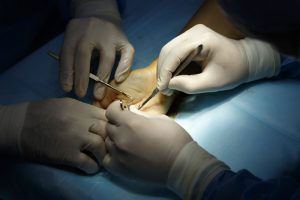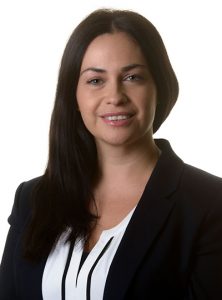 Ms B had suffered from pain in both hands for some years. At first, she had been treated with non-steroidal anti-inflammatories, which controlled her condition for a time. She was then referred for x-rays which showed severe erosive changes at the base of her right thumb.
Ms B had suffered from pain in both hands for some years. At first, she had been treated with non-steroidal anti-inflammatories, which controlled her condition for a time. She was then referred for x-rays which showed severe erosive changes at the base of her right thumb.
From there, she was referred to a consultant in rheumatology and then on to a consultant orthopaedic hand surgeon who diagnosed severe arthritis in the thumb and who recommended the surgery that was undertaken.
Further injury two years after thumb operation
Following this operation, Ms B’s hand seemed to be OK for a while. However, just over two years later, when she was erecting some flat pack furniture, Ms B injured her thumb, leading to numbness and tingling up her arm. She attended A & E but was discharged as it was felt that the symptoms were settling.
Over the next couple of months, Ms B’s symptoms continued, and she visited her GP who, once again referred her to hospital. She was seen by the same orthopaedic surgeon who had treated her previously. She noted that there was some further degenerative change to the base of the thumb, and a splint was fitted. The surgeon did note that further surgery might be needed, and that an artificial procedure (such as bone graft) may be necessary.
Bone graft operation not successful
The operation was carried out the following year, using bone from the iliac crest (part of the upper pelvis). Ms B had to use crutches to get around for a few weeks following the operation. Around seven months later, during which Ms B had been in a lot of pain, it was noted that the bone graft had not been completely successful, and Ms B was put on a waiting list to have the metalwork that had been used during surgery removed and to explore the graft.
Around two months after the operation, Ms B had to attend an out of hours GP service when she suffered a spontaneous onset of shortness of breath and chest pain upon movement. Tests were undertaken and she was referred to her own GP, who examined her. No clear diagnosis was reached, and no treatment was provided, apart from a Ventolin inhaler, nor was any further investigation arranged. The plan was simply that Ms B should see her own GP again if her condition did not improve and that she should attend A & E if her condition worsened, which it did.
Pulmonary embolism leads to taking Warfarin
She attended the out-of-hours service where it was recognised that she required hospital assessment to exclude a pulmonary embolism. A CT scan at the A & E department showed that she had a massive pulmonary embolism and she had to stay in hospital for approximately two weeks. She was treated with the anticoagulant, Warfarin, which she remains on for an indefinite time.
Ms B had a pre-operative assessment booked, but the anticoagulant team said the operation should not go ahead and the appointment would be cancelled. The pre-operative assessment appointment was not cancelled and as Ms B did not turn up for it, her name was taken off the waiting list for the operation. The operation eventually took place around ten months later, when the metalwork was removed and it was decided not to fix the failed part of the bone graft for various reasons, including the possibility of infection.
Nikki pursues hospital and GP for breach of duty of care
Ms B contacted Graysons and Nikki took up her case, pursuing both the GP and hospital for breach of duty of care.
It was alleged that:
- the surgeon should have known that the surgery she planned and undertook were unusual and unrecognised as surgical procedures to manage the complication that Ms B had developed
- the surgeon should have made proper enquiries as to whether it had been undertaken elsewhere and with what results
- had the surgeon carried out these checks, she would have found that the only published study said that such an operation was likely to fail, and
- having found such evidence, the surgeon should have warned Ms B about this and discussed alternative treatment
It was alleged that the GP had:
- not taken account of Ms B’s previous history of sudden onset of chest pain
- erred in her conclusion that Ms B had no risk factors for venous thrombo-embolism (and pulmonary embolism), when in fact a number of risk factors were present
Nikki wins medical negligence compensation, despite difficulties
This case was strongly denied by both defendants throughout. Court proceedings were issued in June 2017 and a trial was eventually listed for 16 December 2019, with a time estimate of five days. Experts’ meetings and conferences took place regularly throughout the case. The defendants’ witness evidence was strong, but Nikki was able to identify holes in it which led to them making partial admissions. However, despite Nikki making various offers to settle the case, the defendants refused to engage, until three weeks before the trial when they made a settlement offer that was not commercially viable and to which Ms B’s insurance after the event insurance company would not agree.
Nikki received negative advice on the merits of the case from counsel and it looked like the case was going to be abandoned as it would not be able to win at trial. Using her litigation experience and knowledge of the defendants’ litigation style, Nikki managed to achieve an excellent compensation settlement for Ms B. As Ms B wanted to avoid trial in any event, she was extremely satisfied, and she knew that the case would have had to be discontinued and she would have ended up with no compensation if we had been unable to settle the claim.
This was an extremely complex case, given the number of defendants and the need for multiple experts (five) amongst other issues. The experts needed careful management and the defendants tried to apply pressure jointly on Nikki to encourage her to discontinue prematurely. This, clearly, did not work as Nikki’s experience allowed her to gauge the risks for the defendant in the case and use this to the claimant’s advantage.
If you feel that you have suffered injury or illness due to the negligence of any healthcare staff, contact our experts now. We will offer you a free of charge appointment in which we can assess your case, and, if we take on your case, we will offer you a no-win, no fee arrangement to take it forward. You can also find out more about making a medical negligence compensation claim on our web pages.
Author: Nikki Yavari, medical negligence solicitor.

